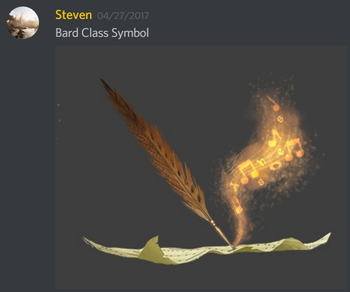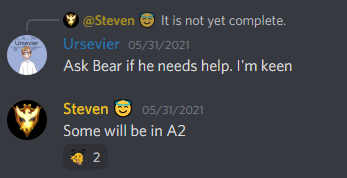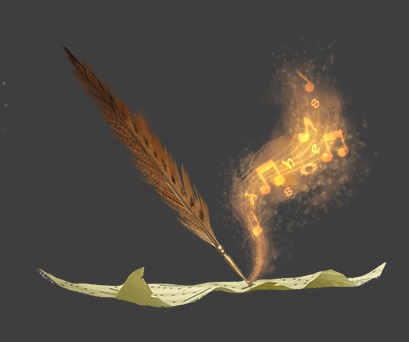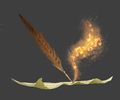Barde
Zur Navigation springen
Zur Suche springen
Barde is an archetype in Ashes of Creation.[2]
- Bards are intended to amplify a party or raid's ability to perform within their own class. That amplification isn't just intended for DPS, but also for support, for healing, for taking damage, for movement. Bards have often been portrayed as a musical class and while they can be that, many Bard applications may exist in just telling a story. Telling a story is going to be the thematic component of how the Bard interacts with the party. And that story is going to enhance player's abilities to perform. Very similar in a way to buffing up a party, but you are not going to see him as a "buff bot" that you might have experienced in previous games, where they are only good for their buffs and then you kick them out of party and they sit in a corner and come back in 30 minutes. Those buffs are going to be related to how they perform.[3] – Steven Sharif
Barde fills a non-healing support role that makes a party better as a whole through a range of buff-oriented and proximity based abilities.[4][5][6]
- Q: Regarding the class composition and design revolving around the Holy Trinity, if that is the case where does a non-healing support fall into that concept of design and how will players who choose that path remain relevant throughout the gameplay loops?
- A: This is a more old school idea of the Holy Trinity and where non-healing support classes fall into that mix. Generally you see in my experience most non-healing support classes fall into between the hybrid of support to tank or support to DPS, so they tend to fill a hybrid role. The Bard has an opportunity to fill that space and is a very integral component to maximizing a particular group or archetypes ability to perform through the use of their supportive and buff-oriented abilities as we've talked in the past. Many of these are support based on proximity. Some of them are support based on targeted buffs. We're going to be following the format of abilities that adhere to dances, songs, and stories when it relates to the Bard; and the scope of their particular ability sets- each of those provide a certain type of benefit to to other characters within proximity. The idea here again, pointing back to a more old-school trinity design is that no party is complete without the non-healing support class, which is the Bard in Ashes of Creation.[4] – Steven Sharif
Bard classes
Fertigkeiten/Fähigkeiten
Bards fill a tactical non-healing hard support role. They will have more significance based on their mobility and placement in the battle.[7][4][5][6]
- Q: Give us a hint on their mechanic please?
- A: Proximity based skill combination melodies, through dance song and story. Hard utility and support, you will see in the future.[7]
- Bard mechanics include proximity-based skill combination melodies through dances, songs, and stories.[7][4][8]
- Bards can choose to activate buffs that augment tanking, evasion, DPS and healing abilities in their proximity.[9]
- Some buffs are related to how the bard performs in combat: If a bard lands a skill shot against a target, allies within a certain range might be granted a temporary buff that relates to the skill that the bard used.[3]
- Bards can offer proximity-based or proc-based healing, but to a much lesser degree than Clerics.[4][5][10]
- Let's say the Bard is using a weapon, has a sword out and... does some gladiatorial looking performance attack and it looks so great. It inspires his friends around him to increase their multiplier on critical damage, and now they deal additional damage against targets for the next 10 seconds or 8 seconds. So, you're going to need to be active. You're going to worry about your position, the relation of the position of your party members to you in order to accentuate really what you offer the party.[3] – Steven Sharif
- Bards will have a wide range of abilities to choose from, such as wordsmithing, acting, and musical aspects.[11]
- Bards are intended to not be purely support focussed. They will be a "jack of all trades", including offensive and defensive combat abilities in addition to support abilities and buffs.[15][16]
- Based on proximity, based on your mobility and placement within the battle you're going to have more significance. So it's going to be to a degree a tactical type scenario for those non-healing support classes to be cognizant of. You know, where on the battlefield they need to be positioned in connection with the group that they're trying to augment or support; and so that gives a little bit more tactical sense to these non-healing support classes that's more relevant to them than other classes per-se.[5] – Steven Sharif
- Bards will not be the "downtime" class. This is the role of social spaces within nodes.[16]
- Bards will have utility outside of combat, like all other classes.[18]
- In other games, Bards tend to be a relatively passive way of playing and that's really not the direction that we want to go with it. We want every class to be fun to play. We want every class to be viable. We want you to feel like you are doing something: That your moment-to-moment gameplay is fun; so a lot of that stuff is going to be based on combos, on reactive interactions between your party members and the mob that you're fighting, or the player character that you're fighting. There's going to be a lot of movement from the front lines to the back lines to help out and make sure that everybody is supported in the way that they're doing it; and that you are also being active in what you're doing. You're not just sitting in the back passively playing a lute and not having any fun.[19] – Jeffrey Bard
Musical abilities
- The Bard archetype will be able to play musical instruments, such as flutes, bagpipes, drums, and fiddles.[20][12][11][13][14]
- Other archetypes may also be able to play certain musical instruments at some future time.[12]
- Custom music creation (using the likes of the Music Macro Language) will not be present in the game on release.[21]
- There may be a specific gear slot for musical instruments, but this has not been finalized yet.[22]
List of musical instruments
Bard augments
Zeitplan
The Barde archetype is scheduled for release at the start of Alpha-2.[23][24]
Music
Der Hauptkomponist von Ashes of Creation ist Bear McCreary. Seine Musik wird in Alpha-2 und Beta-1 enthüllt.[27][28][29]
- Unsere aktuelle Musik ist Platzhalter. Wir arbeiten mit Bear McCreary für unsere offizielle Musik zusammen, die wir während der Alpha 2 und Beta 1 enthüllen wollen.[27]
- Bestimmte Bosse und Begegnungen werden spezielle Original Soundtracks erhalten. [30]
- Die Nodes werden thematische Musik bieten, die auf der vorherrschenden Kultur der Node basiert.[22]
- Mit Biomen und POIs sind bestimmte musikalische Themen verbunden. Das Vorhandensein bestimmter Handlungsstränge kann das Thema für diesen Bereich auf mehreren Ebenen verweben. [22]
- Wenn wir über Biome und über POIs sprechen: Jeder von ihnen wird unterschiedliche Themen haben, die mit ihm verbunden sind. Wenn ihr also in der Wildnis oder an einem bestimmten POI unterwegs seid, werden dort Soundtracks abgespielt. Darüber hinaus umfasst jedes dieser Systeme einen Schichteffekt, der das Stadium bestimmter Arten von Ereignissen in einem Gebiet widerspiegeln kann. So zum Beispiel der POI Carphen: Er wird ein allgemeines Thema für Carphin haben, das abgespielt wird, wenn ihr euch in das Gebiet bewegt. Abhängig von den Auswirkungen eines bestimmten Handlungsbogens können wir jedoch eine Ebene des Soundtracks einbinden, die dies widerspiegelt vielleicht die Stimme des Raid-Boss, wenn sie anwesend ist.[22] – Steven Sharif
- Kampfzustände können auch unterschiedliche musikalische Themen beinhalten. [22]
- Musik von Alpha-1 und in livestream-Dev-Updates ist Platzhaltermusik. Es ist keine Musik für Ashes of Creation zum Launch vorgesehen.[31]
- Der Soundtrack wird entweder Elemente der Intrige oder des Mysteriums oder des Horrors enthalten, die Teil des Durchwindens dieses Levels sind, um zu diesem Boss zu gelangen, und sich bis zum Crescendo des Kampfes steigert. Musik ist ein so wichtiger Teil der Inszenierung – die emotionale Präsenz dessen, was ihr in dieser immersiven Welt tut. Es löst emotionale Reaktionen aus. Und wir haben einen großartigen Komponisten, Bear McCreary, der an God of War, Battlestar Galactica, Outlander und Black Sails gearbeitet hat; viele tolle Franchises und tolle IPs; und ich denke, er wird großartige Arbeit leisten, indem er die Essenz dessen einfängt, was diese emotionale Reaktion eines Spielers sein sollte.[30] – Steven Sharif
- Intrepid Studios werden die Rechte an der Musik von Ashes of Creation besitzen.[32]
- Wenn wir Musik in unserem Spiel veröffentlichen, möchten wir, dass Inhaltsersteller in der Lage sind, Inhalte mit unserem Spiel zu erstellen. Schreibt uns also einfach eine Nachricht und wir werden versuchen, eines dieser [DMCA]-Probleme zu lösen, falls ihr auf eines stoßt.[32] – Margaret Krohn
Bildmaterial
2024-01-31
Archetype list
| Icon | Archetype | Type.[33] |
|---|---|---|
| Barde | Magisch | |

|
Kleriker | Magisch |
| Kämpfer | Physisch | |

|
Magier | Magisch |

|
Waldläufer | Physisch |
| Schurke | Physisch | |

|
Beschwörer | Magisch |

|
Tank | Physisch |
Siehe auch
Einzelnachweise
- ↑

- ↑ Archetype breakdown.
- ↑ 3.0 3.1 3.2 Liveübertragung, 2018-04-8 (PM) (46:11).
- ↑ 4.0 4.1 4.2 4.3 4.4 Liveübertragung, 2023-04-07 (1:05:57).
- ↑ 5.0 5.1 5.2 5.3 Podcast, 2021-04-11 (13:30).
- ↑ 6.0 6.1 Liveübertragung, 2018-01-18 (45:52).
- ↑ 7.0 7.1 7.2

- ↑ Liveübertragung, 2022-12-02 (1:04:16).
- ↑ Interview, 2020-07-19 (1:00:04).
- ↑ Liveübertragung, 2020-07-25 (58:38).
- ↑ 11.0 11.1 11.2 Liveübertragung, 2019-06-28 (1:21:02).
- ↑ 12.0 12.1 12.2 Liveübertragung, 2022-12-02 (1:26:47).
- ↑ 13.0 13.1 Liveübertragung, 2018-04-8 (PM) (1:18:37).
- ↑ 14.0 14.1 Liveübertragung, 2017-07-28 (40:15).
- ↑ 15.0 15.1 Interview, 2021-06-13 (8:33).
- ↑ 16.0 16.1 Liveübertragung, 2017-05-17 (1:06:19).
- ↑ Liveübertragung, 2022-01-28 (1:09:26).
- ↑ 18.0 18.1 Liveübertragung, 2017-05-19 (39:55).
- ↑ Liveübertragung, 2017-06-01 (22:58).
- ↑ 20.0 20.1 Liveübertragung, 2024-02-29 (1:10:23).
- ↑ Liveübertragung, 2020-11-30 (1:15:35).
- ↑ 22.0 22.1 22.2 22.3 22.4 Liveübertragung, 2023-09-29 (1:08:25).
- ↑ Interview, 2023-07-09 (1:11:29).
- ↑ Interview, 2023-07-09 (1:06:53).
- ↑ Interview, 2020-10-17 (53:50).
- ↑ 27.0 27.1 X.com - Ashes of Creation Music.
- ↑

- ↑

- ↑ 30.0 30.1 Interview, 2021-06-13 (11:15).
- ↑

- ↑ 32.0 32.1 Liveübertragung, 2021-06-25 (1:07:45).
- ↑ Interview, 2020-07-29 (49:53).









